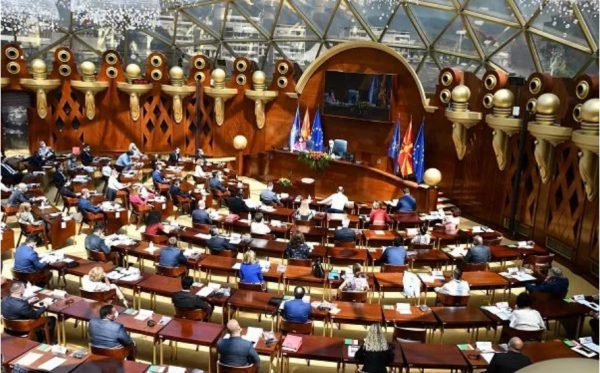Discourse quality in Parliament got an average score of 5.5 on a scale of 1 to 10, shows the latest report of the Institute for Democracy covering the period from Aug. 4 to Dec. 31, 2020.
“The monitoring report reaffirms the two-year trend of low discourse quality in the Assembly, and the conclusion that there is a lot of space for improvement,” the Institute for Democracy says Friday.
The Skopje-based think tank has been monitoring discourse quality in Parliament and the work in general of the legislative house since June 2014.
January 2020 marked the start of the fourth monitoring cycle of the Institute for Democracy as part of the Parliament Support Program (PSP), implemented in partnership with the National Democratic Institute (NDI) and the Centre for Change Management (CCM). The process focused on discussions referring to the items on the Assembly’s agenda within the areas of rule of law, human rights, and democracy.
“In the respective period, on a scale of 1 to 10, the discourse quality score is 5,5 – which is indicative of lowered discourse quality compared to the period July – December 2019, when discourse quality score was 6,0. Thus far, the score of the discourse quality in the Assembly during the respective monitoring period is the lowest, compared to previous monitoring periods in 2018 and 2019. Unlike previous periods, discourse quality in the Assembly has not reached the minimal required score to be called a debate,” says the report.
Opposition MPs were more actively engaged in discussion, taking part in 61% of the monitored discussions, while the MPs from the parliamentary majority took part in 39% of the discussions. Three female MPs, including Gordana Siljanovska Davkova, Dafina Stojanovska and Zaklina Lazarevska are listed among the 10 most active MPs, it is noted.
During the monitoring period, only one Q&A session was held. Regarding use of arguments in a discussion, a general significant decline is noted compared to the previous period. “Speakers lacked argumentation in 44% of speeches, and used poor argumentation in 45% of speeches. One or several arguments were noted only in 11% of the discussions, compared to 29% in the previous monitoring period,” says the Institute for Democracy report.
The percentage of changed views as result of better argumentation remains significantly low in order to draw a conclusion that the MPs demonstrate openness to acknowledge better arguments presented by others. In 54% of the discussions, says the document, MPs failed to address the strength and quality of argumentation of other speakers, whereas in 37% of the discussions the MPs kept their views and failed to recognize the valid argumentation of colleagues from other political options, 27% up compared to the previous period (10%).
Lawmakers increasingly focus on the personality of their interlocutors, rather than on their arguments. In 16% of the speeches, MPs showed respect or partial respect for arguments presented by MPs from other political parties, and disrespect or partial disrespect towards arguments in 26% of the discussions. Respect or partial respect towards their personality was demonstrated in 32%, and disrespect or partial disrespect in 20% of the discussions.
“This report also notes that MPs’ addressing of the rights of marginalized groups is persistently low, in all periods of monitoring. It is noted that in over 93% of the discussions, MPs fail to address the rights of marginalized groups, unless the discussion refers to a specific law or topic on the agenda which is related to their rights. Similarly to the previous period (July–December 2019), no marginalized group is represented by more than 3% in the discussions,” says the Institute for Democracy.
















